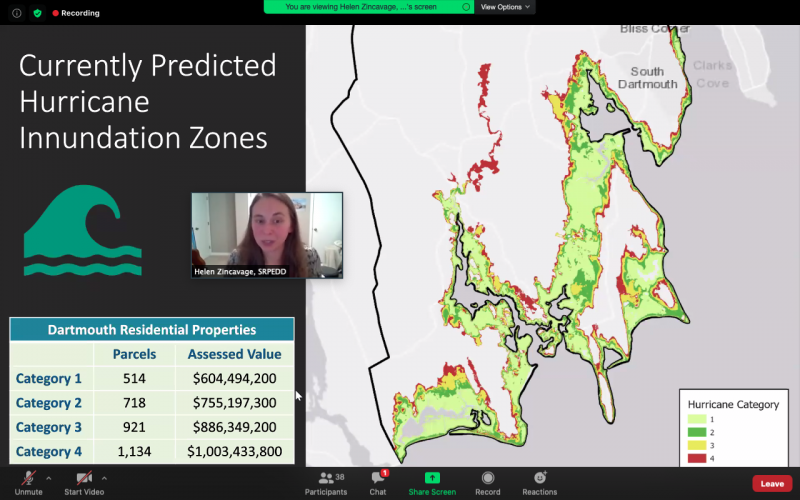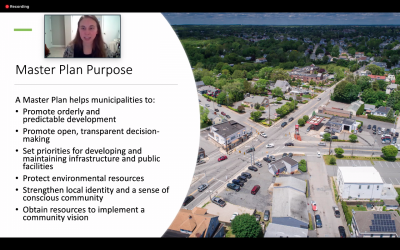Here’s what Dartmouth residents hope to do about climate change
Wetland protection and restoration. Clean energy and electric vehicles. More biking and pedestrian paths. Walkable village centers. More natural greenspace and fewer lawns.
These are some of the climate change mitigation strategies set out by townspeople for Dartmouth’s Master Plan at the Southeastern Regional Planning and Economic Development District’s fourth workshop, which was held via Zoom on Jan. 28.
The master plan — currently in development by the town and the regional planning district — is a guiding document produced every decade to assess where the town is now, how it got here, and where to go from here.
Residents can suggest future action in ten key areas at different workshops for each.
Since 2019, there have been four workshops. The latest had been scheduled for March 2020 — but it was postponed nearly a year due to the pandemic.
Dozens of attendees took part in the virtual meeting to discuss climate change and resilience for the town, led by the regional planning district’s Assistant Director of Environmental Programs Helen Zincavage, along with other district staffers.
During the workshop Zincavage noted that the northeastern US has already experienced temperature and sea level rise above global averages.
If emissions continue to rise at current levels, by 2050 Massachusetts can expect to see around 36 fewer days below freezing and around 13 more days over 90 degrees Fahrenheit, with the sea level rising by as much as 2.4 feet, she stated.
“It could be as much as 6.5 feet by the end of the century,” Zincavage said. “That’s just sea level rise, without also considering the associated storm impacts and flooding impacts that would come on top of that.”
Zincavage pointed out that 2,434 acres of land in Dartmouth lie under five feet in elevation — including seven miles of roads and 360 units of housing, around $365 million worth of property.
There is an estimated 40% risk that at least one flood above the five foot high water mark will hit Dartmouth by 2040, she added.
And according to the Federal Emergency Management Agency, known flood risk zones in town contain $1.5 billion in assessed value.
But flooding is far from the only danger faced by a warming world.
By 2050, the northeastern US can expect around 650 more deaths per year from heat, Zincavage said.
Fewer days below freezing could have big implications for agricultural pests and other insects like mosquitoes and ticks, increasing instances of Lyme disease or Eastern Equine Encephalitis.
Meanwhile warming waters could adversely affect sea life, with less dissolved oxygen and more bacteria and algal blooms.
Dartmouth has already developed a hazard mitigation plan including priority items like establishing additional emergency shelters and evacuation procedures, increasing drainage and flood protection infrastructure in sensitive areas, and improving outreach and communications.
But what else can the town do to mitigate climate change risks?
The 38 attendees at the meeting broke into four different groups to discuss their ideas, before coming back with lists of priorities like improving drainage infrastructure and preserving natural landscapes to combat erosion and flooding.
Other action items highlighted by residents included minimizing coastal development, focusing on redevelopment rather than clearing new areas to build, and upgrading vulnerable roadways.
Raising public awareness of the issues and focusing on clean energy, energy efficiency at home, and electric vehicle uptake are also priorities, along with creating more routes for walking and cycling.
“There’s a younger generation that really does not seem to want to own cars, and they want more walkable village areas,” observed Town Administrator Shawn MacInnes. “They're looking for [more consolidated spaces]….That’s something we can look to achieve.”
Planning Board member Steve Taylor responded, “I agree with [that] totally, and I’m in the older generation!”
To view interactive maps or comment on climate change mitigation goals, the workshop engagement hub can be found at www.srpedd.org/dartmouthmp/climate through February.
Visit srpedd.org/comprehensive-planning/community-master-plans/dartmouth-master-plan for more information about the master planning process or to view a recording of the workshop.













